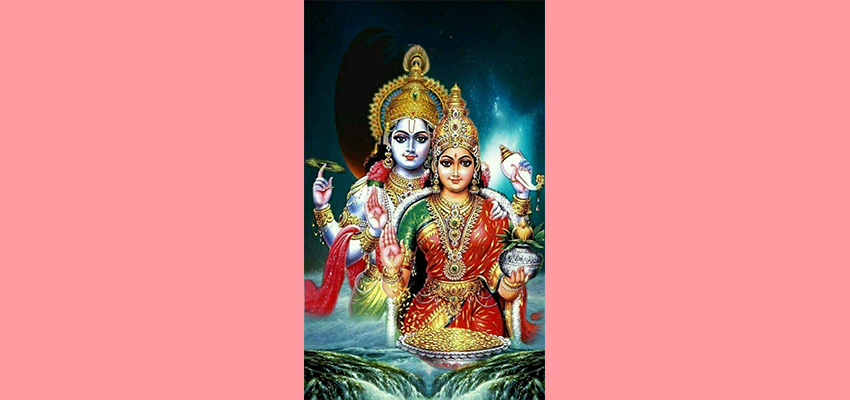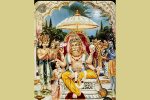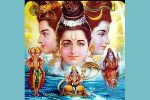NAME 22
Śrīmān श्रीमान्
Śrī refers to the Consort of Viṣṇu, Goddess Lakṣmī, who is well known for auspiciousness. Viṣṇu holds His Consort Lakṣmī in His chest. Hence He is fondly called as Śrīmān. The form of Viṣṇu is known for auspiciousness and resplendence and His Consort Lakṣmī has the same qualities. Because He beholds Lakṣmī in His chest, He appears splendiferous.
Goddess Lakṣmī Herself says in Lakṣmī tantra (II.13), “He Hari (another name for Viṣṇu. Literal meaning – carrying) being “I” (the Self), is regarded as the self in all beings and I am the eternal “I” hood of all living beings.” This refers to Puruṣa and Prakṛti of Vedānta.
Pāñcarātra system gives grandness to Goddess Lakṣmī treating Viṣṇu as the Supreme Brahman or the static energy and the Goddess Lakṣmī as His kinetic force, to sustain the universe. It is only on the permission of Goddess Lakṣmī, one can attain the lotus feet of Viṣṇu or liberation.
२२. ||ॐ श्रीमते नमः||
22. Om Śrīmatey Namah
(22) Sreemaan -One who is always with (“maan”) Sree. Mother Sree is Mother Lakshmi. In the Puranic terminology Lakshmi stands for all powers, all faculties. The total manifested power potential in the Omnipotent is Lakshmi. These powers are ever in Him and therefore, He is the Sreemaan.
|| ॐ श्रीमते नमः||
Om Śrīmatey Namah
INTERPRETATION GUIDED BY SANT VANI (WORDS OF SAINTS)
Śrimān (also the names 178, 220, 613)
The one who has Lakṣmi (on His chest).
He is Śrimān because Śri , that is Lakṣmī resides permanently on His chest. Vakṣasi is the word, in the bhaṣya indicating the chest. Śri generally means, the Goddess of wealth. She is chanchala and never stays for long in one place or with one person. But, she stays permanently with Bhagavān. All the resources belong to Bhagavān. Therefore, the one who always has Śrī with Him on His chest, is Śrīmān. Śri is always with Him and hence all wealth belongs to Īśvara.
Please watch 19.56min to 24.37min
A location is given for this aham, the ‘I,’ and it is said that the heart is where it is located. This is the same as when we say ‘he has given his heart to you.’ If you want to own up an action of which you are proud, then, you touch the heart and say ‘I did this.’ Interestingly this is the same with people in all cultures. When they want to point to themselves, they don’t point to their head saying, ‘I did it’. This expression is based on experience. When it is said that Lakṣhmi is in the heart, it means that, she is united with the ‘I’ of Parameśvara. Lord Viṣhṇu is Parameśvara and He is all-pervasive. He is always united with Lakṣmi. The Lord is endowed with Śri and without Śri , that is, māyā there is no Īśvara. Lord Śhiva with māyā is presented as ardhanārīśvara. One half is the female, śhakti and the other half is male.
Śri is required for sthiti or sustenance. Everything in the world is looked upon as Lakṣhmī.
Success is Jayalakṣmi, which is also Śri and that success is got from Parameśvara. Dhana belongs to Him and hence any Śri, any wealth that is there, is Dhanalakṣmi. Any marital happiness is Varalakṣmi. Home is that which gives happiness and that is called Grihalakṣmi. Children give happiness and that is Santānalakṣmi. Śrī is mangala. Bhagavān is the one who has the six limitless bhagas or virtues and one of them is Śri. Śri is the most important of these six bhagas and Bhagavān is Śrimān.



